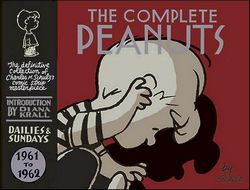Comics /
Comic Reviews /
Comic Strips
The Complete Peanuts: 1961 to 1962 (Volume 6)
By Leroy Douresseaux
October 12, 2006 - 11:54
Designer: Seth
Editor: Gary Groth
With an introduction by singer and modern jazz legend Diana Krall (a two-time Grammy Award winner), The Complete Peanuts: 1961-1962 (the sixth volume of the series) launches into what many fans of famed Peanuts creator, Charles M. Schulz, consider the Golden Age of the strip. New cast members appear – Frieda, the girl who obnoxiously reminds everyone that she has “naturally curly hair” and her seemingly boneless cat, Faron.
Charlie Brown’s little sister, Sally, who was only born in 1959 (reprinted in The Complete Peanuts: 1959-1960 – the fifth volume), has rapidly matured in just a few years time and enters kindergarten. This volume also contains the third “Great Pumpkin” sequence” (the first happened in 1960), the one in which Sally disastrously spends her first Halloween in a local pumpkin patch with Linus, waiting for the Great Pumpkin, who, of course, never arrives. This Great Pumpkin story and the first were combined to form much of the plot to the classic Peanuts holiday special, “It’s the Great Pumpkin, Charlie Brown.”
Linus also gets glasses. One of my all-time favorite storylines appears here – when Lucy buried Linus’ blanket (which ran for three weeks of daily strips from Jan. 2 to Jan. 21, 1961). Although Charlie Brown’s baseball team reportedly lost just about every game they played during the course of the strip, it seems as if they won a game in the June 18, 1961 episode.
In her introduction, Krall writes of Schulz, “His creations appeal to you as a child and speak to you as an adult.” Perhaps, this is mere coincidence, as the strips in this volume (some have never before been reprinted and some are not available in any in-print Peanuts collection) were some of the first I encountered when I was old enough to buy my own Peanuts collections. Reading them again made me realize that these strips stayed with me because they appealed to me as child, but continued to speak to me as I grew up. In the four panels that make up the Jan. 30, 1962 episode, Schulz was describing what most of my life in public school would be like. If that sounds wishy-washy, that’s only the power of Schulz’s work talking.
Rating: 9 /10
Last Updated: January 17, 2025 - 08:20
